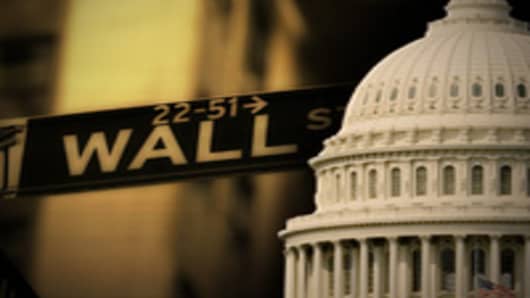I suppose on the economic and financial stuff you could have all sorts of stress tests to see what things look like under certain draconian circumstances. Or you could, I suppose, require certain levels of profitability.
But how do you ever know? And is it legal?
The comptroller of the currency - I forget his name- said in 1914 that panics were a thing of the past. With the establishment of the Federal Reserve Bank it was "mathematically impossible" for the nation to be seized by another panic, as they called financial calamities back then (maybe we should forget his name). Point is, if this stuff gets politicized then the system we think we have is no more. Who should declare the end of political uncertainty? I didn't know there was a deity in charge of such proclamations. As uncomfortable as it may seem after the recent trauma, we are going to have to let managers manage and make financial decisions without political interference.
And it will be imperfect.
Greek Prime Minister George Papandreou is also talking some funny stuff. He said yesterday that "unprincipled speculators are making billions every day by betting on a Greek default." He is referring to market guys that buy or sell credit default swaps.
The problem is the Greek government has about $400 billion of debt outstanding. But according to a study released Monday by the German financial regulator, BaFin, there is no evidence that credit default swaps have been used to speculate against Greek debt. Net volumes in the credit default swaps market in Greek debt has been unchanged since January at around $9 billion. $9 billion against $400 billion debt outstanding. The "unprincipled speculators" are the Greek officials who continued to pump out massive bond offerings under incorrect indentures. The government said their deficit this year would be 3.7% of GDP until pressured to refigure it, and, whoops!, it turned out to be more than 3 times that. So, did credit default swaps contribute to the financial mess, or are they merely reflecting it?
While we are on the topic of "they said what?", Rep. Eric Massa (D. NY) admitted he had groped a male aid but that's not why he's retiring from Congress. He also alleges his actions were not sexual in nature. If it wasn't sexual, what was it? I worry about the answer to that question and I'm not sure I want to hear it. I don't have security clearance for stuff like that.
And I know this has to have been taken out of context and/or it came out wrong, but Nancy Pelosi said, "We have to pass the health care bill to find out what's in it." Huh?
If I were working for the President I would be taking a very different tack on the message to the public.
I would say that in the past year the stock market is up almost 70%, and 40% from the inauguration. The gross domestic product was up at a 5.9% annual rate in the fourth quarter. While jobs have not yet started to grow, last January we lost almost 800,000 jobs and we should soon see plus figures in that column. Interest rates are low, inflation is tame, profits are up and many economic indicators have turned strongly to the positive. We saved the financial system.
But the administration is wrapped around the axle of health care reform.
The Republican party would be trumpeting such financial accomplishments to no end, and the Democrats don't know how to celebrate.
_______________________________________
Vincent Farrell, Jr. is chief investment officer at Soleil Securities Group and a regular contributor to CNBC.


